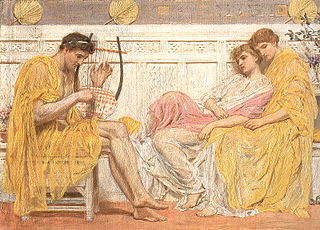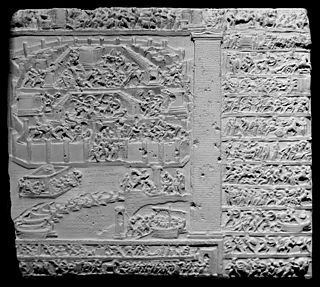
The 4th century BC started the first day of 400 BC and ended the last day of 301 BC. It is considered part of the Classical era, epoch, or historical period.
This article concerns the period 559 BC – 550 BC.

Bacchylides was a Greek lyric poet. Later Greeks included him in the canonical list of Nine Lyric Poets, which included his uncle Simonides. The elegance and polished style of his lyrics have been noted in Bacchylidean scholarship since at least Longinus. Some scholars have characterized these qualities as superficial charm. He has often been compared unfavourably with his contemporary, Pindar, as "a kind of Boccherini to Pindar's Haydn". However, the differences in their styles do not allow for easy comparison, and translator Robert Fagles has written that "to blame Bacchylides for not being Pindar is as childish a judgement as to condemn ... Marvell for missing the grandeur of Milton". His career coincided with the ascendency of dramatic styles of poetry, as embodied in the works of Aeschylus or Sophocles, and he is in fact considered one of the last poets of major significance within the more ancient tradition of purely lyric poetry. The most notable features of his lyrics are their clarity in expression and simplicity of thought, making them an ideal introduction to the study of Greek lyric poetry in general and to Pindar's verse in particular.

Simonides of Ceos was a Greek lyric poet, born at Ioulis on Ceos. The scholars of Hellenistic Alexandria included him in the canonical list of the nine lyric poets esteemed by them as worthy of critical study. Included on this list was Bacchylides, his nephew, and Pindar, reputedly a bitter rival, both of whom benefited from his innovative approach to lyric poetry. Simonides, however, was more involved than either in the major events and with the personalities of their times.

Ibycus was an Ancient Greek lyric poet, a citizen of Rhegium in Magna Graecia, probably active at Samos during the reign of the tyrant Polycrates and numbered by the scholars of Hellenistic Alexandria in the canonical list of nine lyric poets. He was mainly remembered in antiquity for pederastic verses, but he also composed lyrical narratives on mythological themes in the manner of Stesichorus. His work survives today only as quotations by ancient scholars or recorded on fragments of papyrus recovered from archaeological sites in Egypt, yet his extant verses include what are considered some of the finest examples of Greek poetry. The following lines, dedicated to a lover, Euryalus, were recorded by Athenaeus as a famous example of amorous praise:

Pindar was an Ancient Greek lyric poet from Thebes. Of the canonical nine lyric poets of ancient Greece, his work is the best preserved. Quintilian wrote, "Of the nine lyric poets, Pindar is by far the greatest, in virtue of his inspired magnificence, the beauty of his thoughts and figures, the rich exuberance of his language and matter, and his rolling flood of eloquence, characteristics which, as Horace rightly held, make him inimitable." His poems can also, however, seem difficult and even peculiar. The Athenian comic playwright Eupolis once remarked that they "are already reduced to silence by the disinclination of the multitude for elegant learning". Some scholars in the modern age also found his poetry perplexing, at least until the 1896 discovery of some poems by his rival Bacchylides; comparisons of their work showed that many of Pindar's idiosyncrasies are typical of archaic genres rather than of only the poet himself. His poetry, while admired by critics, still challenges the casual reader and his work is largely unread among the general public.

Anacreon was a Greek lyric poet, notable for his drinking songs and erotic poems. Later Greeks included him in the canonical list of Nine Lyric Poets. Anacreon wrote all of his poetry in the ancient Ionic dialect. Like all early lyric poetry, it was composed to be sung or recited to the accompaniment of music, usually the lyre. Anacreon's poetry touched on universal themes of love, infatuation, disappointment, revelry, parties, festivals and the observations of everyday people and life.

Timocreon of Ialysus in Rhodes was a Greek lyric poet who flourished about 480 BC, at the time of the Persian Wars. His poetry survives only in a very few fragments, and some claim he has received less attention from modern scholars than he deserves. He seems to have composed convivial verses for drinking parties. However he is remembered particularly for his bitter clashes with Themistocles and Simonides over the issue of his medizing, for which he had been banished from his home around the time of the Greek victory at the Battle of Salamis. He was also an athlete of some distinction and reputedly a glutton.

Kea, also known as Tzia and in antiquity Keos, is a Greek island in the Cyclades archipelago in the Aegean Sea. Kea is part of the Kea-Kythnos regional unit.

Stesichorus was a Greek lyric poet. He is best known for telling epic stories in lyric metres but he is also famous for some ancient traditions about his life, such as his opposition to the tyrant Phalaris, and the blindness he is said to have incurred and cured by composing verses first insulting and then flattering to Helen of Troy.

The Nine Lyric or Melic Poets were a canonical group of ancient Greek poets esteemed by the scholars of Hellenistic Alexandria as worthy of critical study. In the Palatine Anthology it is said that they established lyric song.
The following outline is provided as an overview of and topical guide to classical studies:

The epinikion or epinicion is a genre of occasional poetry also known in English as a victory ode. In ancient Greece, the epinikion most often took the form of a choral lyric, commissioned for and performed at the celebration of an athletic victory in the Panhellenic Games and sometimes in honor of a victory in war. Major poets in the genre are Simonides, Bacchylides, and Pindar.
Melanippides of Melos, one of the most celebrated lyric poets in the use of dithyramb, and an exponent of the "new music."
Titus Flavius Simonides Agrippa, also known as Titus Flavius Agrippa, and was an aristocratic, wealthy Roman Jew.

Greek lyric is the body of lyric poetry written in dialects of Ancient Greek. It is primarily associated with the early 7th to the early 5th centuries BC, sometimes called the "Lyric Age of Greece", but continued to be written into the Hellenistic and Imperial periods.
Leocrates, son of Stroebus, was a leading Athenian general of the First Peloponnesian War. He led the Athenian forces that conquered the island of Aegina, traditionally a naval rival of Athens.
Semonides of Amorgos was a Greek iambic and elegiac poet who is believed to have lived during the seventh century BC. Fragments of his poetry survive as quotations in other ancient authors, the most extensive and well known of which is a satiric account of different types of women which is often cited in discussions of misogyny in Archaic Greece. The poem takes the form of a catalogue, with each type of woman represented by an animal whose characteristics—in the poet's scheme—are also characteristic of a large body of the female population. Other fragments belong to the registers of gnomic poetry and wisdom literature in which the Hesiodic Works and Days and the Theognidea are classed, and reflect a similarly pessimistic view of the human experience. There is also evidence that Semonides composed the sort of personal invective found in the work of his near contemporary iambographer Archilochus and the later Hipponax, but no surviving fragment can be securely attributed to such a poem.
Ode to Polycrates is an ancient Greek poem written by Ibycus and dedicated to Polycrates, tyrant of Samos. It was composed some time in the middle of the 6th century BC and displays close similarities to the work of Stesichorus.











